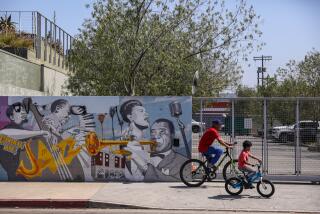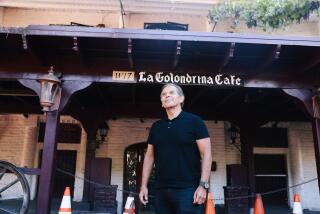When Protest Edges Up to Racism
- Share via
When Danny Bakewell spoke at the Bethel African Methodist Episcopal Church last Saturday, I was troubled by the way he said “Korean.”
He stretched it out, so that by the time he got to the middle syllable, it had turned into a sneer--”Kor-EE-an.” I’ve heard people use the same technique to turn other proper nouns into terms of derision. Jew. Mexican. Black.
It reminded me of the way the old Southern sheriffs sneered when they said the word “Negro,” taking so long that you could time it with the second hand of your watch.
Bakewell, an influential black leader, was speaking to about 300 African-Americans protesting the sentence given to a Korean-born woman grocer convicted of killing a 15-year-old African-American girl. Found guilty of voluntary manslaughter, the woman, Soon Ja Du, was sentenced to five years’ probation, and ordered to pay a $500 fine and do 400 hours of community service.
On a videotape of the March 16 killing, recorded by the store’s security camera, the girl, Latasha Harlins, was shown approaching the counter to pay for a bottle of juice. Du, thinking she was stealing the juice, grabbed Harlins. The teen-ager punched Du several times in the face. Du hurled a stool at the girl. The teen-ager set the juice on the counter and turned to walk away. Du reached behind the counter for a pistol and shot the girl in the back of the head.
Protests closed the store, and Bakewell was the driving force behind them. There was always a strong anti-Korean undertone to what he said. Twelve days after the killing, Bakewell told protesters outside the store, “We are not against Koreans, as such. We are against Koreans, and anybody else doing business, who are disrespectful to black people. . . .”
When Bakewell rose to speak at Bethel church Saturday, he recalled the dismay shown by whites and Koreans at such protests.
He said he was cautioned that “you ought to dialogue with the Kor-EE-ans, or somebody . . . I am already having a dialogue. I am having a dialogue with my people.”
With such words, Danny Bakewell has tapped into the current of race-based resentment that runs deeply through South L.A., where once-black neighborhoods are becoming more Latino and the small grocery and liquor stores are increasingly owned by Koreans.
Bakewell is a successful real estate developer who heads the Brotherhood Crusade, a Community Chest-type organization that supports black causes. He is also a political power, and his support helped elect Mark Ridley-Thomas to the Los Angeles City Council earlier this year.
Bakewell is a dominating, powerful figure who, in person, is both accommodating and antagonistic. Anger and resentment simmer close to the surface, except when he is talking about the gyms, educational programs, child care, health facilities and other projects supported by the Brotherhood Crusade.
At Saturday’s meeting, I could see how this anger works for Bakewell, how it connects him to the anger felt by many African-American residents of South L.A. neighborhoods. He is a complete departure from previous black leaders, who carefully built coalitions to the white power structure, in the cautious manner of Mayor Tom Bradley.
As I listened, it seemed to me that Bakewell was preaching a no-win course--the politics of exclusion. No-win because African-Americans are a diminishing slice of the electoral pie, even in their once-secure South L.A. base.
But Bakewell was not the only voice in the church.
Rep. Maxine Waters (D-Los Angeles) urged the audience to take the fight to the polls. She proposed a candidate to run for sheriff--Don Jackson, the ex-Hawthorne cop who has become a leading protester against brutal police tactics. And she and others proposed a campaign to defeat Superior Court Judge Joyce A. Karlin, who sentenced Du.
A political pro like Waters knows that exclusion politics won’t win those contests. Karlin runs countywide, and it would take more than African-American votes to beat her. The same is true if Jackson runs for sheriff.
Bakewell is backing the electoral campaign against the judge. But at the church--and then at a press conference Tuesday--he pledged to demonstrate in front of Karlin’s home in Manhattan Beach, an affluent, predominantly white community that has never shown much sympathy to protest movements. “We must make her life as uncomfortable as she has made the life and the family and community of Latasha Harlins,” he said.
It would make her uncomfortable, all right. Her neighbors too.
And the scene will be on TV, for voters all over the county to see, with Bakewell edging up to the line that separates a hot political speech from a dangerous venture into racism.
If Bakewell’s not careful, he’ll end up making the judge a martyr.
More to Read
Sign up for Essential California
The most important California stories and recommendations in your inbox every morning.
You may occasionally receive promotional content from the Los Angeles Times.













